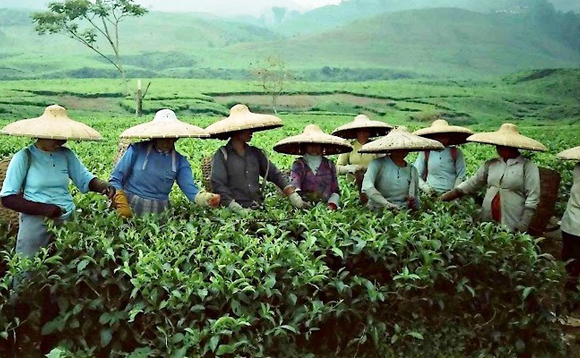
Portfolio: CLSA Capital Partners and Indonesia's Sari Wangi

Sari Wangi is Indonesia's largest private tea player. CLSA Capital Partners invested not so much for exposure to the crop as what the company offers as a platform for distributing agricultural technology.
The tea plantations of western Java are at their most productive between July and October, Indonesia's dry season, but volatile weather conditions in the months preceding can cause havoc with the crop. A deluge of rain might wash off all the fertilizer and thereby reduce yields.
The solution is drip irrigation: a network of pumps, pipes, valves and emitters that controls the flow of water and other nutrients to the tea plants. Application in small doses means fertilizer is pushed down to the roots where there is less run-off. While the origins of modern drip irrigation can be traced back to the 1960s, it only really took off in US agriculture in US in the last 10 years. Indonesia is even further behind, but rising land prices are generating interest.
"Historically land has been so cheap that people didn't want to invest in technology - if you needed more yield you could buy another hectare of land for $200. On Java it's now $6,000-7,000 per hectare so it makes sense to pay $1,000 to 3,000 for equipment that has the same effect," ays Peter Kennedy, head of CLSA Capital Partners' Clean Resources Asia Growth Fund. "We see a lot of new land plantings who want to put a drip down because the payback is 2-3 years on the investment and mitigates weather risk."
Drip irrigation is one of several technology-based solutions that can deliver higher crop yields. Others range from sub-surface sensors that monitor water and nutrition schedules to bio-pesticides and fertilizers. CLSA is banking on demand in Indonesia for all of them as farmers increasingly find themselves under pressure at both ends of the cycle: the economics are changing in terms of inputs while multinational customers want cleaner products.
The PE firm brought relationships with leading technology providers, including Netafim, which controls one third of the global micro-irrigation market, India-based bio-fertilizer specialist Camson and US agri-products producer Marrone Bio Innovations. Camson is a current CLSA portfolio company; Kennedy backed Marrone during an earlier phase of his career at sustainable resources investor Fulcrum Fund.
A suitable partner
The missing piece was a local partner that would serve as a testing base and a distributor for these products. In July 2011, CLSA invested $15 million in Sari Wangi Group, Indonesia's largest private tea company. The alliance was premised on CLSA helping the company set up an agriculture technology subsidiary, Nutrigasi Indonesia.
"When we first went to meet them about three years ago the planes from Singapore were 60% full; now you can't get a flight to Indonesia on a Friday or a Monday," Kennedy says, alluding to the country's emergence as a PE hotspot.
However, the timing was not so much prescient in terms of attractive valuations as Sari Wangi being presented with a potential solution just when it needed one. The company was already looking at product diversification and started experimenting with greenhouses and drip irrigation in 2009; the next step was taking these yield-boosting technologies and rolling them out on a larger scale.
"It is a national issue for Indonesia and not just about tea. For rubber, sugar, coffee, cacao, cassava - the Dutch colonial era commodities - productivity is in decline because the soil in Java and Sumatra has been used for 150 years," explains Rocky Menayang, Sari Wangi's CFO. "In the beginning it was R&D. The edge CLSA gave us was confidence that we are doing the right thing and then access to international networks."
Sari Wangi was already international in its core tea business. The company started out 50 years ago as a tea trader, founded by Johan Alexander Supit - Menayang's father-in-law - who had returned home from London where he worked for Francis Peak, the main supplier to Brooke Bond and Joseph Tetley & Company, which introduced teabags to the UK in the 1950s.
Supit sourced tea from local farmers and shipped blended products to Western multinationals, taking advantage of the government's nationalization initiative that effectively shut foreign firms out of the export market. He was also responsible for Indonesia's first teabag, sold under the Sariwangi brand, which was bought by Unilever in 1989.
"Back then the domestic consumer demand wasn't big enough and it required someone bigger to move the teabag market," says Menayang. "When he sold tea in bags customers thought it was a new packaging concept and so they just tore them open."
Sari Wangi's agreement with Unilever included a clause that prevented it reentering the retail segment for 12 years. Once this expired, the company returned with new brands, drawn by annual growth of 12% in the teabag segment, which now accounts for more than one third of the 70,000 tons of tea Indonesians consume each year. In addition to growing the trading business - two years ago, L. Link Schuurmann, a 150-year-old Dutch trading house, was acquired to strengthen operations in Europe - Sari Wangi moved upstream into plantations.
The company now produces 7,000 tons of tea annually from its own fields and trades about 55,000 tons. It is responsible for more than one quarter of the 35,000 tons Unilever sources from Southeast Asia, predominantly for the Sariwangi brand. Revenue is approximately $130 million per year and Unilever contributes about 15% of that. Government-owned plantation companies may produce more raw tea but Sari Wangi is more than twice the size of the next-largest independent vertically integrated player.
"They are pretty ahead of the curve," says Kennedy. "When we met them they were already rainforest-certified, one of few companies in Indonesia to achieve this. They had sustainability programs to comply with Unilever requirements."
Rainforest certification is essentially a product cleanliness standard, ensuring that farmers don't harvest their crops less than 45 days after applying pesticide and that there is no residue on the leaves. It also sets benchmarks for factory hygiene and the treatment of employees. Now, though, Europe is setting standards that go above and beyond rainforest certification.
Menayang estimates there are 300 parameters on pesticide use, up from just five parameters 2-3 years ago. Vietnam is already paying the price, its tea banned from Europe due to non-compliance.
Dual purpose
CLSA's involvement therefore serves two interrelated functions - helping Sari Wangi keep up to speed with the latest developments in regulation, governance and transparency (which includes the adoption of technology) as well as getting Nutrigasi off the ground.
The structure of its investment reflects these purposes. CLSA subscribed to a three-year convertible note with the option of taking a minority stake in either the parent or the subsidiary; although it may end up with exposure to both. Much rests on building demand for the technology, and not just among tea farmers.
When Sari Wangi trialed Netafim's drip irrigation technology on its plantations, yields improved by 60% on a per kilo basis while fertilizer use fell by 50%. Pilot projects involving sub-surface sensors, bio-fertilizers and bio-pesticides have since been implemented, and progress has been made on tissue culture to develop better seeds, as well as crop population densities that ensure these technologies have optimal impact.
Nutrigasi is now the exclusive distributor for Netafim in Indonesia. One of its first customers was the country's largest state-owned sugar producer, which agreed to trial the technology on a 100-hectare plot. After 10 months of cultivation, average yield per hectare had jumped from 60 tons to 105 tons, without making any parallel improvements to seed or fertilizer quality.
"The government responded positively and announced that it must implement the program more widely," says Menayang. "We have identified 22,000 hectares on government plantations where this technology can be applied immediately and another 60,000 hectares where they need to be thinking seriously about it."
Independent sugar producers - typically those with projects of 10,000 hectares or more - are also expected to be a rich source of demand for technology. Astra International, Indonesia's largest listed company, announced last year that it planned to add sugar and rubber to its agribusiness portfolio and there have already been discussions with Nutrigasi.
Domestic conglomerates Rajawali Group and Medco Group are also entering the spacehave both been allocated land for sugar plantations on the Merauke Integrated Food and Energy Estate in Papua province.
Outsourcing solution
But the ultimate objective for Nutrigasi is to establish itself as a third-party plantation manager, cultivating multiple crops on a contract basis. This fits in with Sari Wangi's differentiation drive: tea plantations covered 64,500 hectares in 2012, according to preliminary data from the Indonesia government statistics bureau; 92,100 hectares were devoted to cocoa, 47,900 hectares to coffee and 456,700 hectares to sugar. Palm oil is the runaway leader on 5.4 million hectares.
Sari Wangi owns approximately 3,500 hectares of plantations, while Nutrigasi already operates nearly 2,000 hectares with more in the pipeline. Government-owned plantations were an obvious first target.
"Tea is very labor intensive so they basically run like small villages, with hospitals, schools and housing. They understand how to manage large pools of labor in the agricultural space and not many people can do this, particularly these new financial investors that are coming in," says Kennedy. "And then the government is fairly inefficient in managing some of this land so there is an opportunity for someone to come in and manage it for them."
Menayang compares Nutrigasi to a turnkey operation: it puts in the infrastructure, whether for drip irrigation or tissue culture, manages the day-to-day operations, and then Sari Wangi handles the off-take. Given the Indonesian government controls about 150,000 hectares of sugar crop and 35,000 for tea, there is massive potential for expansion if the business succeeds in generating sufficient momentum.
The day of reckoning comes next year when CLSA's note converts to equity in Sari Wangi or Nutrigasi. The PE firm entered with a five-year exit horizon and 2014 should also offer some clarity as to what form that exit will take. Either the parent or the subsidiary could pursue an IPO, and another option is selling Nutrigasi to a foreign strategic investor keen to sell technology into Indonesia.
For now, Kennedy is keeping his options open. "As a private equity firm we wanted the downside protection of investing in the cash-generative parent, which might deliver a high teens return," he explains. "But Nutrigasi is a green field operation so there is the potential of a VC-style return if it takes off."
Latest News
Asian GPs slow implementation of ESG policies - survey
Asia-based private equity firms are assigning more dedicated resources to environment, social, and governance (ESG) programmes, but policy changes have slowed in the past 12 months, in part due to concerns raised internally and by LPs, according to a...
Singapore fintech start-up LXA gets $10m seed round
New Enterprise Associates (NEA) has led a USD 10m seed round for Singapore’s LXA, a financial technology start-up launched by a former Asia senior executive at The Blackstone Group.
India's InCred announces $60m round, claims unicorn status
Indian non-bank lender InCred Financial Services said it has received INR 5bn (USD 60m) at a valuation of at least USD 1bn from unnamed investors including “a global private equity fund.”
Insight leads $50m round for Australia's Roller
Insight Partners has led a USD 50m round for Australia’s Roller, a venue management software provider specializing in family fun parks.







